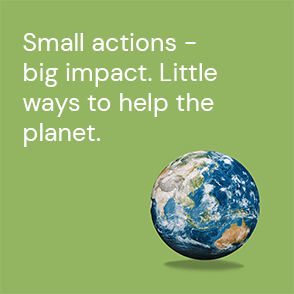ENERGY BILL
Small actions -
big impact. Little
ways to help the planet.
As individuals, we can sometimes feel powerless to impact the environmental challenges faced in the world today significantly; however, the truth is that small steps by each one of us can actually make a profound impact.
From reducing our energy consumption to limiting our water use, there are a variety of steps that we can take to live more sustainably. These actions help to reduce our carbon footprint, save us money, and even improve our quality of life.
So, whether you're an eco-warrior or looking to make a positive change, read on to discover some simple and effective ways to make a big environmental impact from the comfort of your home.
Plant a garden.
According to NASA Global Climate Change, a 2019 study found that planting half a trillion trees could negate 20 years of humanproduced carbon emissions. While this sounds like a large number, if every free-standing home across the world planted two to
three more trees, that would have a profound impact.
As for what types of trees impact Australia most, none other than the native Eucalypt. In addition, environmentally friendly and visually attractive deciduous trees may provide an added benefit when planted strategically, as they can provide natural shading for your home during the summer months and allow sunlight to warm your home in the winter.
In line with www.cityservices.act.gov.au, Yarralumla Nursery has put together a handy guide for deciduous shade trees in the region and advice for positioning, watering, and tree selection.
Recycle locally.
Recycling supports a circular economy, reduces waste from products, by-products and energy and significantly contributes to
sustainable living. Aside from household waste recycling, there are many ways to recycle locally in the region thanks to both ACT
Government programs to encourage recycling and reduce waste, and grassroots, community-implemented charities.
Check out Lids4Kids, The Green Shed, the RecCylery, Roundabout Canberra and the ACT Container Deposit Scheme for ways you can contribute in the local community.
Buy locally sourced food.
When you shop locally, you're supporting regional farmers and producers and reducing carbon emissions from transportation.
One easy way to save money and enjoy fresh, seasonal produce direct from farmers is with a grocery box-sharing system local to you. Grocery box-sharing systems are often community owned and offer a more affordable and sustainable alternative to supermarket produce.
Box Divvy is a food community local to the ACT and NSW providing fresh, nutritious produce that allows you to directly support local farmers and wholesalers and save money. Box Divvy's 'Food Hubs' are based in Watson, Giralang, Evatt and Aranda, with more locations in progress.
Reduce plastic.
With enormous progress made with the reduction of single-use plastic bags, plastic straws and an increase in recycled packaging
from fast food outlets and grocery stores, we can still do more. The CSIRO is on a mission to achieve an 80% reduction in plastic
waste entering the environment by 2030, a goal we can all support in small ways.
Bring your own bags from home, take reusable bags for vegetables rather than using the plastic bags at the supermarket, support bulk foods stores where packaging is reduced, buy unwrapped produce when you can, opt for foods in recycled glass jars or recycled plastic containers, reduce plastics when partying such as balloons, plastic cutlery, plastic party bag fillers - all small ways to make a big difference.
Buy less clothing, ideally from natural fibres.
We are buying more clothes and keeping them for shorter periods, and when polyester and nylon clothes are washed, they expel
small particles that make up a significant part of the microplastics polluting the world's oceans.
Buying natural fibres such as cotton and wool is more sustainable. Aside from reducing ocean contamination, natural fabrics decompose harmlessly once they have reached the end of their lifecycle if they cannot be recycled or reused. Further, their production is less harmful to the environment.
A UK study showed that if the active life of clothing was extended by just nine months, it would save 8% carbon, 10% water and 4% waste per metric tonne. In addition, changing our shopping habits helps reduce the production of new clothing and the amount of clothing going to landfill.
Reduce electricity use.
The average household uses significantly more electricity than needed, and minor tweaks needn't take away from comfort. For
example, cutting showers from eight to four minutes reduces water heating costs, and turning lights off when not in use saves
energy and dollars. Making sure standby setting on appliances aren't sneakily using power, keeping your oven and cooktop clean,
and doing full loads of dishes in the dishwasher or washing machine are all minor tweaks that make a big difference.
Best of all, reducing energy use usually means reducing your energy bills, which is a win for you and the planet.
Summary
- We can take small steps to live more sustainably to reduce our carbon footprint, save money, and even improve our quality of life.
- Plant trees, especially native Eucalyptus or strategically placed deciduous trees for shading and warming homes.
- Recycle locally and support ACT Government programs and community charities such as Lids4Kids, The Green Shed, the RecCylery, Roundabout Canberra, and the ACT Container Deposit Scheme.
- Buy locally sourced food to reduce carbon emissions from transportation and support farmers and producers. For example, try grocery box-sharing systems such as Box Divvy.
- Reduce plastic by bringing your own bags, using reusable bags for produce, supporting bulk food stores, opting for unwrapped produce, and reducing plastic use during parties.
- Buy less clothing, ideally from natural fibres such as cotton and wool, to reduce the production of new clothing and the amount of clothing going to landfill.
- Reduce electricity use by cutting showers and using appliances more efficiently to save energy and money.
ActewAGL's energy saving tips are designed to help you take control of your energy use, while reducing your bills and environmental impact. Save with great value energy plans backed by our sustainability promise, supported by 100% local, award-winning service - so you can LIVE A Good Life now and into the future.
For more information about how you can transition to an energy-efficient home visit the Solarhub & ActewAGL Smart Energy Hub today.
Sources
https://climate.nasa.gov/news/2927/examining-the-viability-of-planting-trees-to-help-mitigate-climate-change/
https://www.evergreentrees.com.au/blogs/plant-care-tips/what-are-the-best-carbon-offsetting-plants-to-green-australia
https://www.lids4kids.org.au/
https://thegreenshed.net.au/
https://actcds.org.au/
https://www.canberraenvironment.org/the-recyclery
https://roundaboutcanberra.org/donate-goods/
Learn more https://app.boxdivvy.com.au/
https://earth911.com/how-and-buy/good-better-best-shopping-for-natural-fibers/
https://www.csiro.au/en/research/environmental-impacts/recycling/plastics
https://www.marineconservation.org.au/how-to-reduce-plastic-use/
Disclaimer: These Energy Savings tips and articles are for information purposes only. Please ensure you are aware of any safety precautions before operating appliances or products.



